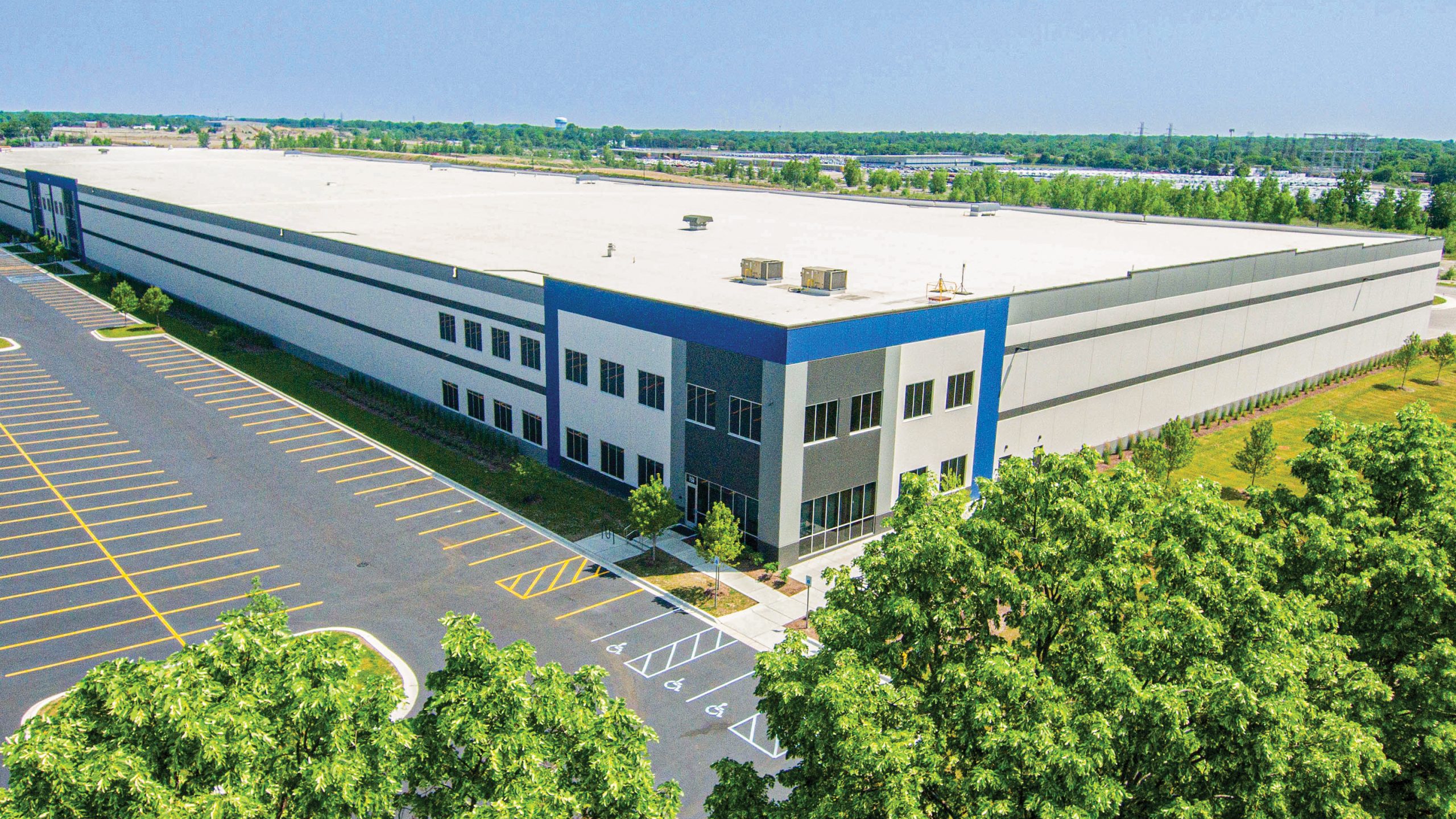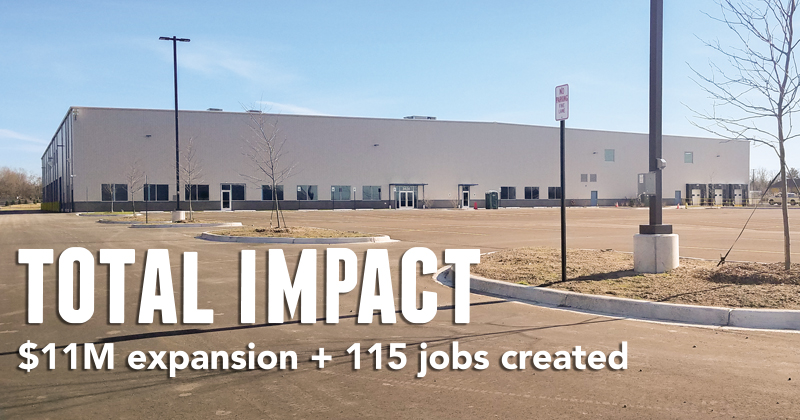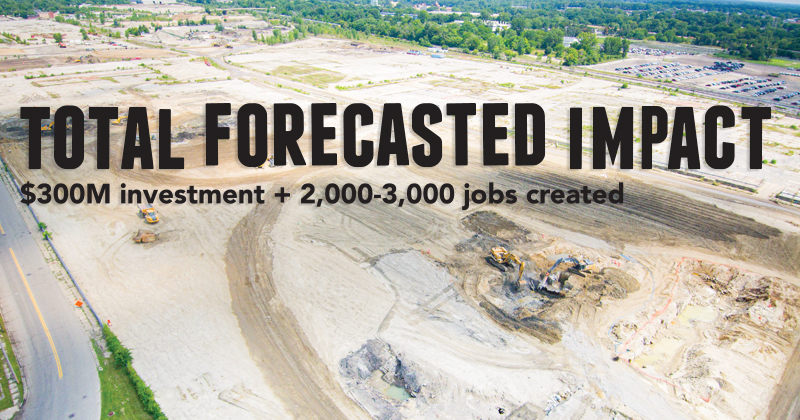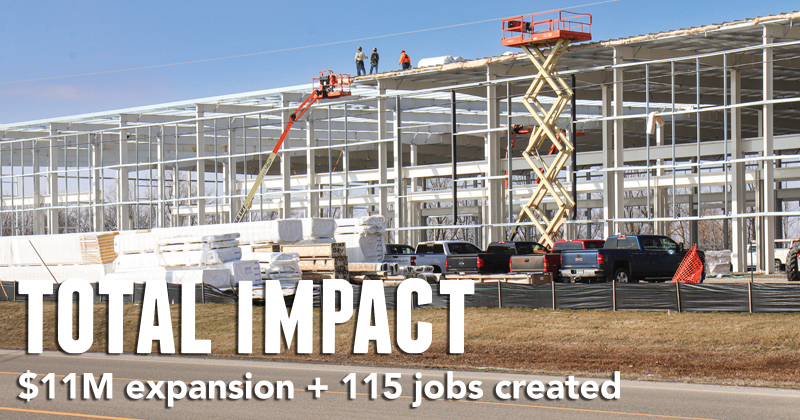
At a time when cities, states, and nations are competing for corporate investment and jobs, business incentives have emerged as a potent tool in economic development toolkits.
From tax credits to workforce training programs, incentives help communities like Flint & Genesee transform their economic landscapes — often with profound results.
“In economic development, nothing drives business expansion and attraction more than sites that have infrastructure, access to workforce talent, and the ability to be served by power, electric, and gas,” said Tyler Rossmaessler, executive director of the Flint & Genesee Economic Alliance, a division of the Flint & Genesee Group. “But business incentives are the icing on the cake.

“They’re that last piece that makes sure a company locates here, versus in Ohio or some other fiercely competitive location.”
Competing for and winning development projects are key components of “Make it in Michigan,” the state’s economic strategy to make the Great Lakes State a more attractive place to live, work, and do business.
The plan focuses on cultivating good-paying jobs, a skilled and talented workforce, vibrant places to live, and powerful tools to continue winning projects that support our communities.
“To grow our economy and build a brighter future, we must continue competing for projects that bring manufacturing and supply chains home, invest in people so they can pursue their potential, and revitalize places to make them more attractive places to live, work, and invest,” said Gov. Gretchen Whitmer in a news release unveiling Make it in Michigan in 2023.
The strategy has so far helped bring $11 billion in projected private investment and over 17,900 committed new jobs to Michigan.
The Michigan Economic Development Corporation (MEDC), in collaboration with more than 100 economic development partners, including the Flint & Genesee Economic Alliance, markets Michigan as the best place to do business and assists businesses in their growth.
The MEDC uses its tools and funding to support and attract growth in several key sectors, including mobility and automotive manufacturing, advanced manufacturing, engineering, design and development, life sciences, and medical technology, said Charles Donaldson, MEDC’s managing director for Regional Development.
The state agency takes its stewardship of taxpayer dollars seriously, with an open and transparent process, Donaldson said.
Yet there’s sometimes a lack of understanding about how incentive programs are structured and monitored. Many people don’t realize these deals are often performance-based, meaning companies only receive financial benefits after meeting benchmarks such as creating jobs, investing in infrastructure, or revitalizing a blighted area. As such, they usually include safeguards such as claw-back provisions, expiration clauses, or wage requirements.
“I think it’s important the public knows that all companies seeking incentives through the MEDC must go through a vigorous project review and meet very clear milestones before any disbursement takes place,” Donaldson said.
When a company chooses to expand or locate in Genesee County, it helps the whole community with new jobs, increased tax revenue, and more demand for local goods and services.
“That business pays taxes, which help our schools, roads, police, and fire,” Rossmaessler said. “They also bring money into our community and disperse it via salaries. All those things make our communities, families, and residents more prosperous.”
To avoid misperceptions about incentives, economic developers must do a better job explaining their overall benefits.
“It’s about what we’re gaining rather than what we’re giving away,” said Tracey Tucker, Flint Township’s economic enhancement director.
There are many state and local incentives available in Michigan. Here’s a short summary of the three most common incentives utilized in Genesee County: tax exemptions, investment reimbursements, and cash incentives.
Industrial Facilities Tax Exemption

Photo courtesy of Flint Township
Michigan’s Industrial Facilities Tax (IFT) Exemption is one of the programs designed to encourage new investment in industrial and high-tech sectors. Projects approved for this incentive make investments that will increase property values. The exemption limits the amount of new taxes paid for up to 12 years.
In simple terms, it’s like Michigan saying, “If you promise to build or upgrade your factory here and help our community, we’ll give you a discount on your taxes for a while.”
That’s exactly what happened with Ground Effects, an automotive product manufacturer that constructed a new, $10.4 million facility on Van Slyke Road, said Tucker.
In 2020, before Ground Effects purchased vacant land in Flint Township, the property was taxed at $18,771. The company was granted a tax exemption for 10 years if they agreed to, among other things, construct a 100,000-square-foot building, bring 275 employees to Flint Township, and hire at least 75 more people over the next two years. They did, Tucker said.
In return, Ground Effects was taxed in 2021 at $126,618 — less than it would have paid without the exemption, but still a significant increase from the $18,771 levied on a vacant lot, she said. That amount has increased annually to $148,508 last year, with those extra dollars going to the township and other taxing units.
It’s an agreement that worked well for Flint Township.
“People think we’re taking money out of our coffers and giving it to companies, but we’re not doing that at all,” Tucker said. “Yes, we are lessening what we’ll bring in (in tax revenue). But it’s still more than what we brought in to start — not to mention all those jobs.”
Brownfield Tax Increment Financing

Abandoned properties — or “brownfields” — are more costly and difficult to develop than undeveloped properties — or “greenfields.” Tax Increment Financing (TIF) can help level the playing field by capturing future taxes to reimburse developers for the added costs of blighted sites.
A key strength of Michigan’s Brownfield TIF law is that developers can be reimbursed for both environmental costs, such as cleanup, as well as non-environmental costs common for these projects, such as demolition and infrastructure improvements.
Proponents say TIF funding can change the future of blighted communities. That’s what everyone is counting on at the former Buick City site in Flint, one of the largest brownfields in Michigan. General Motors ceased vehicle production on the site by 1999. The property sat vacant for decades until Ashley Capital purchased it in 2023.
Now called Flint Commerce Center, the 3.5-million-square-foot industrial park will be developed over several years. When completed, the Flint Commerce Center will represent an investment of $300 million, resulting in approximately 2,000-3,000 new jobs.
The project was made possible, in part, thanks to performance-based grants from the City of Flint, Genesee County, the MEDC, and the Charles Stewart Mott Foundation. As work is completed and meets all pre-approved milestones, Ashley Capital will be reimbursed with the grant funds for approved activities.
Ashley Capital also received a Brownfield TIF from the City of Flint to help cover $72 million spent on eligible costs associated with site work and cleanup. The company will pay taxes on the property, which is now valued much higher, thanks to the new builds on the property. For up to 30 years, they’ll be reimbursed for fronting the cleanup costs using the tax increment, which is the difference between the new property taxes and the pre-development taxes.
Once Ashley Capital is fully reimbursed, the tax increment capture stops and all tax revenue from the property then flows normally to local taxing units, such as the city and the county. The first building, now fully leased, was excluded from the Brownfield TIF, so the city and county already receive its full tax value. The TIF will apply only to future buildings.
The company is excited about Flint Commerce Center and the opportunity to play a key role in redeveloping Flint, said Mark Quimby, vice president of Ashley Capital.
“We could not have moved forward with the redevelopment of Buick City without these performance-based grants and Michigan’s TIF program,” Quimby said. “These incentives made it possible to complete our first building, welcome two tenants, and set the stage for even greater investment and job creation in Flint.”
Michigan Business Development Program

The Michigan Business Development Program (BDP) is an incentive program available from the Michigan Strategic Fund, administered by the MEDC. The program is designed to provide businesses with performance-based grants, loans, and other economic assistance for projects in Michigan that create jobs or provide investment and results.
It’s highly competitive and often reserved for developments creating a minimum of 50 jobs and significant private investment.
It’s a program that worked well for Miller Industries LLC, a family-owned company headquartered in Fenton Township.
Despite opportunities for the company to expand in Ohio, Kentucky, or Indiana, Michigan won Miller’s expansion project in 2023 by utilizing a $450,000 BDP performance-based grant and tax abatement. The expansion enabled the creation of over 115 jobs and $11 million in private investment in Genesee County.
Moving the Economic Needle
Incentives are just one of the ways economic developers can help companies.
“When we’re going out and when we’re talking with companies, the first question we’re asking isn’t how much money do you need, but how can we help?” Donaldson said. “We try to identify the company’s needs, whether it’s a new road to the site, access to utilities, cleaning up environmental contamination, access to capital, or workforce needs.”
If a business applies for a grant or loan, the state performs its due diligence. They consider how many new jobs will be created or retained, how much money the business will spend in Michigan, and if the project will help the community.
If approved, the business enters into a grant agreement with the state outlining the company’s obligations and timelines. The company is paid only when qualified jobs are created or investments made; they do not receive all the funds up front. If they fail to comply, the company must pay the money back.
Business incentives seem to be moving the economic needle in Genesee County.
“We need to have every tool at our disposal so that we can compete for every job,” Rossmaessler said. “We’re in a global marketplace for these developments — and we want Michigan and Genesee County to win.”
